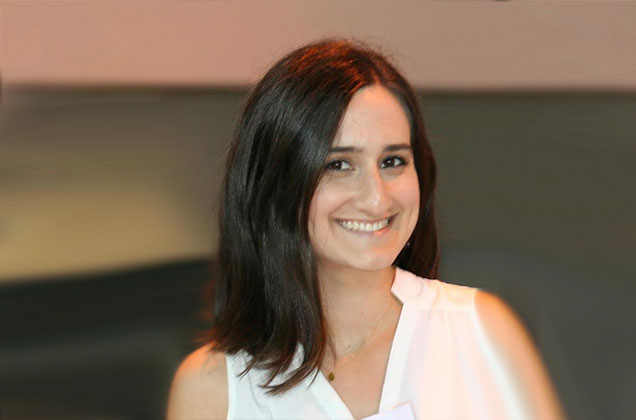29/02/2016
Biological Sciences and Bioengineering 2008 graduate Eylül Harputlugil has been working on the genes and mechanisms through which limiting food intake prior to surgery provides protection to mice for her PhD in James Mitchell's lab at the Harvard University School of Public Health's Genetics and Complex Diseases Department. Eylül says that research on the correlation between limiting calorie/food intake and health has been finally cleared for human experimentation based on clinical testing, and shows positive results.
Eylül was interviewed by T24 on this subject, and although she does not work specifically on human nutrition, she is closely related to the subject as it is the focus of the Department.

Eylül Harputlugil: "I have almost no confidence in the popular science or health news published in Turkey"
The sources referred to by Harputlugil in her T24 interview are at the end of this article.
– Can you talk about your PhD lab and studies there?
My lab focuses on the phenomenon known was "calorie/nutrient restriction." We are studying how surgery results are affected by various modes of nutrient restriction in mice, and, as expected, nutrient-restricted mice fare better in liver and kidney surgeries compared to the unrestricted control group. The correlation between calorie/nutrient restriction and longevity were proven by experiments conducted on rats in the 1930s. Since then, the model was extrapolated to other organisms (mice, flies and worms), which revealed improvements in other health parameters in addition to longevity. Observed improvements include metabolic health (e.g. sensitivity to insulin), and reductions in propensity towards diabetes and cancer. Gradually, this model was repeated first in simian models, and then finally on humans through clinical studies, yielding positive results.
My initial PhD work focused on understanding which specific macronutrients (protein, carbohydrates or lipids, for instance) cause these effects in mice, and we observed that better results were obtained when the intake of protein was limited. One aspect of our study different from many other labs was that we implemented a restricted nutrient regime not for months or years, but only for the week before surgery. In the rest of my work, I study the genes that play a part in this effect, and the cellular mechanisms that cause these results. As an outcome of these studies, we discovered the role of a gene in mice that had not been shown to be required for this phenomenon beforehand.
– Are there human studies on this subject?
We are not involved in human studies as it is beyond the expertise of our lab. These are conducted by people who are experts in clinical trials on humans. As such, it is too early to extrapolate the results to humans. But I think it will be quite exciting if this study is performed on humans and similar positive results are obtained.
– What are your trusted references in nutrition?
Among institutions that issue regular nutrition recommendations are the World Health Organization (WHO), the US Department of Agriculture (USDA)1, and the nutrition department of our school (Harvard Nutrition Source)2. I consider these institutions to be more reliable than referencing singular studies since they assess new scientific data on an ongoing basis, and in a way blend the data from all published scientific experiments. That is because, like in many other areas of science, dozens of new publications are made in nutrition every day and some of them have contradicting results, which is perfectly normal. For people with a vocational interest in science, it is not difficult to uncover the reasons for such irregularities and decide on what is correct and what is not. But there is a greater risk for laypeople to learn only a part of this information, which will likely have gone through biased screening to be released to the public, and be misled about the subject. This is why I find it more reliable when all available data is assessed together, and better to take such institutions as reference.
– Can you discuss the actual content of these recommendations?
These are mostly stuff that we know or have heard but would rather not accept or believe, so we go on looking for the "miracle diet." The USDA issued a guidance for 2015 to 2020, where they recommend eating the following foods within calorie limits:
All vegetables from all subgroups (dark green, red, orange as well as grains and legumes)
Fruits (all types of fruit)
Pulse (at least half must be whole-grain)
Skim or semi-skim dairy products (milk, yogurt, cheese, soy products)
Various proteins (seafood, lean meat or chicken, eggs, grains, soy products, nuts and seeds)
Fats (saturated fats and trans fats must be limited)
The rest of the document is available here: http://health.gov/dietaryguidelines/2015/guidelines/
– Are there differences of opinion between the institutions you named?
There are slight variations and disagreements, but the fundamentals are consistent overall. I should also point out that none of these are absolute truths. Just like in every other field of science, nutrition has no shortage of new findings and discoveries which lead researchers to revise their results based on lengthy discussions. The USDA recommendations I mentioned did raise a considerable debate, but as I said, this comes as little surprise. Another issue is that nutritional needs may vary for people who already have a disease (such as diabetes), and this requires personalized recommendations by a physician.
– Is it possible to limit calorie intake without adverse effects on lean mass and bone minerals?
The calorie/nutrient restriction regime we talked about is based on animal models and is still being tested on humans, so I think it would be irresponsible to recommend this for the time being. There may be adverse effects that are yet to be discovered. However, if an individual consumes more calories than recommended, we can suggest that they limit their intake to the recommended levels, which is another form of restriction.
– Have you met anybody who didn't recommend a diet?
I can't say for sure. We are inundated with writings about some diet or another that people have tried or have had their friends or relatives try. One such diet is the one where you are supposed not to consume any carbohydrates, including whole grains and fruit.
– A recent article claimed correlation between gluten and osteoporosis. Are there any facts to support this? What should we make of such news?
When I see an article like this, I first check the original source, and then the scientific research that it cites (if any). I could have checked if there was a link to that article you spoke of. All too often, these are cases where someone says something stupid and everyone else jumps on the bandwagon. It's likely that the article was copied and pasted from another website, that much of the important details were lost in translation, and that the original source had a biased or exaggerated view of the scientific study in the first place. In some instances, it is a self-proclaimed "expert" that makes assertions without any scientific background. What I mean is this: popular science or health articles are written or translated so poorly that I have almost no confidence in them. Since this is my own field, I can easily check the original source. But I would never accept as truth any science news outside my field, especially in Turkish-language sources. I recommend regarding such news from this angle.
– What do you think about alkali diets?
I saw some popular media claims that an alkali diet is effective against cancer. The basic premise is that since some cancer cells were shown to reproduce more quickly in an acidic environment, eating alkali (basic) foods can prevent their growth. The point missed here is so essential that it is taught in high schools. First, pH levels vary from one body part to another, and these levels are regulated very strictly. For example, the stomach fluid is highly acidic while blood is slightly basic (between pH 7.35 and 7.45). The foods we eat go to the stomach first, where they are digested by the acid and join the bloodstream through the gastrointestinal system. Since the pH level of blood is strictly regulated, the pH levels of the foods we eat do not alter the acidity of blood; it remains within the same range. Which means that a phenomenon observed in a test tube cannot be extrapolated to the body just like that.
– Would you say that vitamins and supplements improve the overall health of a person?
It is difficult to speak of a singular "overall health." Health is a vast concept that includes many different parameters. About vitamin pills, I can say that if a person cannot take enough vitamins by nutrition alone, supplements may be used to cover the deficit. For example, vitamin D supplements are common in northern countries because the body cannot synthesize enough vitamin D with the amount of sunlight they get.
– I think scientists agree with you about Omega-3 and B12, but there is an argument that most other vitamins and supplements just pass through the stomach to the intestines and then excreted without doing much good for the body. What would you say?
Vitamins, supplements in particular, are a huge category and we can't make generalizations. They all have different physical properties and ways of being processed in the body. For instance, it is true that water-soluble vitamins are not stored in the body and the excess is excreted. But fat-soluble vitamins can be stored, and excess quantities may be harmful (such as vitamin A). This is a common illusion: whereas people may not be certain that "natural" or "homeopathic" remedies will do them any good, they don't consider the possibility that they may be harmful.
– Let's say someone doesn't like broccoli. Can they make up for their loss in nutrients by taking supplements?
Vitamins or vegetables shouldn't be considered for their singular nutrient values. We need a more holistic approach. No diet recommendation mandates that you must eat that fruit or this vegetable. If a person doesn't like broccoli, this is not a huge problem on its own; there are many other vegetables that they could eat. But not eating any vegetables and trying to get the nutrients from supplements is not right.
– It is estimated that 23,000 people are taken to emergency wards as a result of so-called "natural" vitamins or supplements every year in the US alone. What would you say about this quest for a miracle cure?
First, let me give some background information on why supplements are so popular and dangerous. The products categorized as “dietary supplements” in the US are subject to regulations that are much more different and lax compared to "drugs." Drugs intended to cure or prevent a specific disease have to go through years of strict and comprehensive “clinical trials” where their efficacy and safety are consistently proven, and then receive authorization from the FDA (Food and Drug Administration). However, “dietary supplements” are not subject to such stringent controls3. Any company can manufacture and market a supplement containing ingredients that have been shown to be safe previously, and no clinical trials or FDA approval are required.
I think many people fail to understand the difference and buy these products with the conviction that "it must work if it's sold in a pharmacy." Labeling conventions are loose for supplements as well, which means manufacturers can play with words to circumvent what few rules there are. Another factor is that people find it difficult to stick with the conventional diets prescribed by physicians and they seek a miracle cure.
– We recently saw this supplement (http://www.superiorhealthsupplement.com), do you know anything about it?
I hadn't heard of this before, so I checked the link you gave me and saw the following under frequently asked questions:
“Is there any scientific evidence proving the benefits of Laminine?
The extract from a fertilized avian egg has been the subject of scientific studies and experiments for numerous decades. It all started in 1929 when a Canadian doctor decided to figure out whether the extract could be used as a natural remedy for cancer. Extensive research continued in the 1980s and intensified even further after 2000. Numerous clinical trials have taken place to determine what the nutrients found in fertilized avian eggs are and how these nutrients can affect human health. New clinical studies are being executed all the time, revealing more and more information about the incredible qualities of Laminine.”
It must be noted that there is no citation of or reference to the results of the clinical studies they claim, which is highly suspicious.
Going back to your question about supplements, some US authorities issue recommendations to warn people about these. FDA's recommendations can be summarized in a few points:
* Supplements are not an alternative to a healthy diet; these should be used to supplement a healthy diet only.
* It is a good idea to consult a physician before taking supplements (these may go into reactions with any medicine you may be using or be harmful if you have any special conditions).
* Some things to consider about supplement websites that you may come across5: Who owns the site, is it a reliable company? What is the purpose of the site: marketing or information? Are there any scientific citations? (We can't say this for Laminine.)
– There is a different group who believes that colloidal silver is good for health. Is this a safe or effective ingredient?
This was news to me as well, so I checked the US National Institute for Health's (NIH) National Center for Complementary and Integrative Health website, where I found a page on colloidal silver.
Here is an excerpt:
The Bottom Line
How much do we know about colloidal silver?
There are no high quality studies on the health effects of taking colloidal silver, but we do have good evidence of its dangers.
What do we know about the effectiveness of colloidal silver?
Claims made about the health benefits of taking colloidal silver aren’t backed up by studies.
What do we know about the safety of colloidal silver?
The U.S. Food and Drug Administration (FDA) has said that colloidal silver isn’t safe or effective for treating any disease or condition.”
– Final question: What effects do probiotics have on our health?
There are millions of microorganisms that cohabitate our intestinal flora, and the type, distribution and health of these microorganisms are critical for our health. There is increasingly more research on gut microbiota and its effects on human health recently. Probiotics are products which contain microorganisms that resemble the healthy microorganisms in our intestines. The purpose of these ingredients is to regulate intestinal flora back to normal levels when some conditions or diseases alter the microbiota, which may possibly assist treatment. The study of the effects of probiotics on various diseases is a relatively new subject. Which means that although there is considerable scientific data pointing to positive results, there is much to learn and discover. I can recommend the same website for practical recommendations7.
“What's the Bottom Line
How much do we know about probiotics?
Although a great deal of research has been done on probiotics, much remains to be learned.
What do we know about the usefulness of probiotics?
Some probiotics may help to prevent diarrhea that is caused by infections or antibiotics. They may also help with symptoms of irritable bowel syndrome. However, benefits have not been conclusively demonstrated, and not all probiotics have the same effects.
What do we know about the safety of probiotics?
In healthy people, probiotics usually have only minor side effects, if any. However, in people with underlying health problems (for example, weakened immune systems), serious complications such as infections have occasionally been reported,”
The third point in particular is why I would recommend anyone planning to use probiotics to consult a physician beforehand.
About Eylül Harputlugil
Eylül completed her bachelor's degree in the Biological Sciences and Bioengineering Program of Sabancı University in 2008. As a student, she took part in bioinformatics and computational biology research in Uğur Sezerman's lab. During her master's degree, she worked in Mehmet Öztürk's lab in the Bilkent University Molecular Biology and Genetics Department where she studied epigenetic changes in liver cancer cells. She joined James Mitchell's lab at the Harvard University School of Public Health's Genetics and Complex Diseases Department for her PhD. During her five and a half years there, she worked on the genes and mechanisms through which limiting food intake prior to surgery provides protection to mice. She completed and presented her dissertation last month and is about to graduate.
References:
(All websites current as of January 10, 2016)
1 US Department of Agriculture website: http://www.cnpp.usda.gov/DietaryGuidelines
2 Harvard University Nutrition Department website: http://www.hsph.harvard.edu/nutritionsource/
3 Some resources on the FDA website:
http://www.fda.gov/Food/DietarySupplements/UsingDietarySupplements/ucm11...
http://www.fda.gov/Food/DietarySupplements/QADietarySupplements/default....
http://www.fda.gov/Food/DietarySupplements/UsingDietarySupplements/ucm11...
http://www.fda.gov/Food/IngredientsPackagingLabeling/LabelingNutrition/u...
4 http://www.superiorhealthsupplement.com/laminine-frequently-asked-questi...
5 http://www.fda.gov/Food/DietarySupplements/UsingDietarySupplements/ucm11...
6 https://nccih.nih.gov/health/silver
7 https://nccih.nih.gov/health/probiotics/introduction.htm
Source: T24




